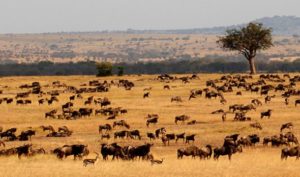
Stock photography and footage are one of the major culprits in the over-simplification of the African reality. As a South African company operating in this industry, visual solutions company Greatstock is acutely aware of the pervasive narratives that feed the constant demand for the same type of “African” content.
A simple Google image search for “Africa” or “African people” confirms the very worst of society’s patronizing stereotypes. Going on the results alone, you would be forgiven for thinking that Africa can be reduced to stunning scenery and wildlife on the one hand and poverty and despair—with the occasional group of white people enjoying Cape Town—on the other.
The “African people” image results even suggest refining the search to “dancing,” “poor,” “happy” or “starving,” because those are the most common characteristics the rest of the world seems to ascribe to Africans.
While not fabricated, the images of struggle and poverty in Africa have been distorted through their overuse, perpetuating the idea that there can be no other African reality.
In “Rewriting Africa”, a scathing parody of the dominant African narrative, renowned author Binayavanga Wainaina defines “taboo” subjects when it comes to talking about Africa as ordinary domestic scenes, references to African writers or intellectuals, and mention of school-going children who are not suffering from Ebola.
“Broad brushstrokes throughout are good. Avoid having the African characters laugh, or struggle to educate their kids, or just make do in mundane circumstances,” writes Wainaina.
Stock stereotypes
There are two very clear extremes when it comes to the visual representation of Africans in the realm of stock imagery. There are either images of starving people and children in abject poverty or there are highly posed pictures of African-Americans trying to pass off as being representative of Africans.
There is a complete dearth of the “everyday” content that truly reflects African life—and life in each of Africa’s very unique, diverse countries. It’s a conversation that the industry as a whole needs to have with itself and its clients, because we are ultimately the ones who either perpetuate or counter the stereotypes in the content we put out into the world.
Source: Margi Sheard at bdlive.co.za

